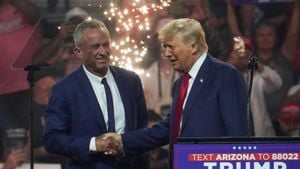Senator Chuck Grassley isn’t holding back when it involves his views on the FBI's leadership. Recently, the Iowa senator issued a glaring "no confidence" vote directed at FBI Director Christopher Wray and Deputy Director Paul Abbate, expressing his discontent through an emphatic letter laden with critiques.
Grassley’s scathing assessment springs from what he perceives as deep-rooted failures within the Bureau’s leadership. Notably, he alleges Wray has displayed what he calls a “double standard” concerning the agency’s investigations. Grassley argues the FBI’s approach to former President Donald Trump starkly contrasts with how they handled allegations tied to President Joe Biden and his son, Hunter Biden. He points to the steep criticism the FBI faced after the execution of search warrants involving Trump, compared to what he describes as leniency concerning the Bidens.
It’s not only partisan grievances being aired. Grassley raised multiple issues reflective of his bigger worry about transparency and accountability within the FBI. He provided several examples to back up his argument, including:
- The agency's reluctance to provide updates about sexual misconduct allegations involving its personnel.
- Alleged delays and stonewalling from the FBI concerning congressional inquiries about the vetting processes for Afghan evacuees.
- A memo issued by the FBI categorizing certain Christian groups as potential violent extremists.
- Retaliation against whistleblowers who raised concerns about mismanagement within the Bureau.
For someone like Grassley, who has spent his political career advocating for government transparency, his tone reveals significant frustration. He remarked, “I’ve always called out those in government who have fought against it. I must express my vote of no confidence in your continued leadership of the FBI.”
Following his meeting with Kash Patel, Trump's nominee to replace Wray, Grassley emphasized the importance of selecting leaders who could restore the FBI’s credibility with the public—a sentiment echoed by several GOP members. Patel’s bid for confirmation is expected to be closely accompanied by discussions on Wray’s future.
The senator’s letter, spanning 11 pages, paints Wray's career as riddled with missed opportunities and mismanagement. He references Wray’s assurance to him years ago to reform the Bureau after it faced intense scrutiny during the investigation of Russia’s interference in the 2016 election. Despite those commitments, Grassley’s current evaluation indicates he believes Wray has fallen short.
Pointing to the notable FBI raid on Trump’s Mar-a-Lago estate—an action framed by Grassley as unprecedented and overly aggressive—he argues it encapsulates the failed approach of current FBI leadership. The senator claims it signaled extreme measures taken against Trump, whom he called subjected to “a continuing double standard.” This interplay of events showcases the tensions within the political narrative surrounding the FBI, Trump, and Biden.
Nevertheless, Grassley is not just voicing concerns without proposing solutions. His assertion for accountability extends past mere criticism; he advocates for substantial change at the top, implicitly calling for Wray and Abbate to vacate their posts. Patel has garnered support from within the ranks; some Republican senators have come forward expressing optimism about his potential direction for the FBI. For them, he embodies the hope of injecting transparency back within the Bureau, with promises to dismantle what they label the ‘deep state’ influence.
Senator Joni Ernst (R-Iowa) expressed confidence, tweeting, “Kash Patel will create much-needed transparency at the FBI,” echoing the urgency felt by many Republicans. Grassley’s insistence on fresh leadership finds support among those advocating for government reforms, aiming to realign the agency’s priorities.
Understanding this situation requires examining the broader political playing field. The FBI’s role, as it stands amid this contentious environment, influences not only Republican perspectives but also public trust. The weight of Grassley’s words holds substantial significance as debates about the Bureau and its leadership continue to evolve.
Even as Trump seeks to solidify his administration's positions with his picks, the question looms large: Will Wray step down voluntarily, or will action be taken by the administration to replace him? Already entrenched within the turbulent waters of partisan debate, the outcome of this scenario can direct how the FBI navigates its reputation and responsibilities moving forward.
If history is any indication, the momentum behind Grassley’s no-confidence vote reflects growing impatience among some Republicans for answers and clear accountability. The pathway to restoring trust within the FBI seems fraught with challenges, not only due to external pressures but also internal misgivings. Grassley’s decisive stance might pave the way for substantial changes at the FBI, aligning with Republican priorities heading forward.



